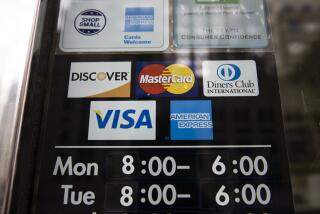The hidden costs of credit cards
- Share via
It seems like a no-brainer. Your credit card offers you a $1 reward for every $100 you spend. It’s not a huge payback, but it’s something: a rebate that might as well be free money.
Who wouldn’t sign up for a card with rebates instead of one without them? And then, who wouldn’t swipe the card for everything — groceries, gas and the movies?
The fact is, credit card rebates are hurting, not helping, many unsuspecting consumers.
These programs raise prices for everyone in ways that most people do not recognize. They also encourage people to use credit unwisely. And they punish those with the discipline to buy only with cash.
The primary winners in the rebate game are the credit card companies. They offer these programs because they profit from the interest rates they charge their cardholders and from the fees they charge merchants. The rebates encourage people to use credit instead of cash, and the credit card companies’ profits increase.
Merchants — who generally must accept credit cards from their customers to be competitive — are caught in the middle. They pay high fees to the credit card companies when their customers pay with credit cards. But the merchants benefit because they are paid quickly for credit sales, they do not have to incur the costs involved in extending their own credit to customers, and they do not have to worry about bounced checks. Although they rightly complain about high merchant fees, they can ultimately pass them along to their customers in the form of higher prices.
Who gets hurt? The consumer. Especially the cash customer.
More generous rebate programs mean the credit card companies must charge merchants higher fees to pay the rebates, and higher fees mean higher prices for everyone. All customers pay the higher prices, but only the credit customers ultimately receive the rebates. So cash customers are the ones most hurt by rebate programs. They bear the brunt of these rebate programs.
Many cash customers do not use credit because they want to live responsibly within their means. For some, credit abstinence is their ultimate protection against credit abuse. Some are simply too poor to qualify for credit. It is shameful that despite their poverty or their discipline, cash customers pay higher prices so that others can use credit cards and get rebates.
Our government can solve this problem. Perhaps the best solution would be to make merchants advertise and tag goods with cash prices — the cost to the consumer minus the credit card merchant’s fees — rather than just the prices that include the credit card markups.
The difference between seeing cash vs. credit card prices is very important. Marketing studies show that people are more likely to use credit when they do not see that they are paying for it than when they pay an explicit charge to use credit. Consumers are also much less likely to ask for a cash discount when doing so is not the norm.
Merchants must quote their prices on a comparable basis to ensure that comparison shopping is not unnecessarily confusing. Thus, government regulations that set pricing standards are completely appropriate. Unfortunately, now we generally see prices that include credit card costs rather than vice versa.
California and nine other states
already regulate pricing standards, but they choose the wrong standard. Under the influence of the credit card companies, they made it illegal for merchants to post a price and then add a surcharge for using credit. Rather than consumers clearly seeing the cost of using credit cards on
their receipts, those costs remain
hidden.
Another way the government could address the markup problem is simply by regulating rebates — by making them illegal or by limiting them to some very small percentage of sales. This strategy would solve the problems described above, but it would introduce unwelcome regulation. It would be wiser to set the right pricing standard than to regulate rebates.
Credit card companies provide valuable services to consumers and merchants by ensuring that payments are convenient and secure. But their rebate programs impose costs upon consumers who do not use credit, and encourage consumers who don’t want to or should not use credit to pull out the card. This disguised coercion must end. The new Consumer Financial Protection Bureau should put credit card rebates at the top of its agenda.
Larry Harris is a professor of finance and business economics at the USC Marshall School of Business. He was chief economist of the Securities and Exchange Commission from 2002 to 2004.
More to Read
A cure for the common opinion
Get thought-provoking perspectives with our weekly newsletter.
You may occasionally receive promotional content from the Los Angeles Times.









